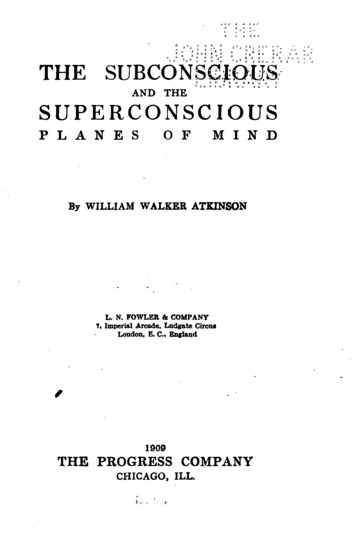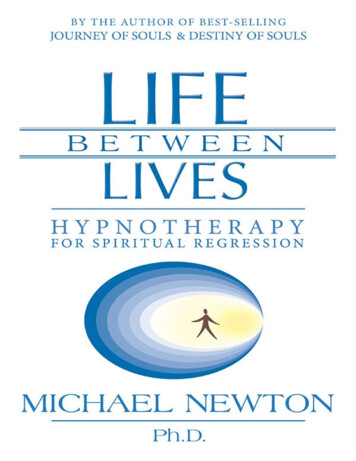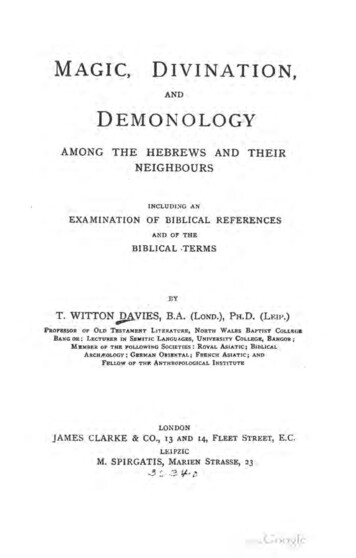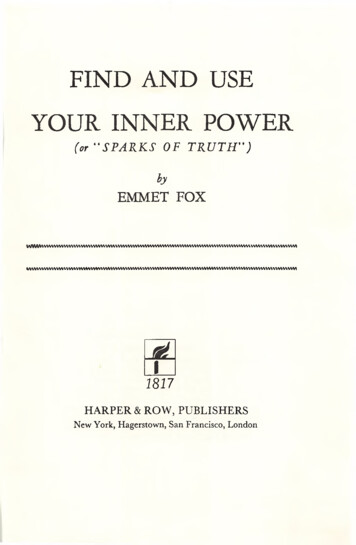
Transcription
THE SUBCONS ;I;Oi AND THESUPERCONSCIOUSP L A N E SO FM I N DBy WILLIAM WALKEE ATKINSONL. N. FOWLER & COMPANY7, Imperial Arcade, Ludgate CircusLondon, E. C. England1909THE PROGRESS COMPANYCHICAGO, ILL.
Copyright 1900ByTBB PROGRESS COMPANYChicago, HL, IT. S. A.
.PAGEInfra-Conscious Mentality9The Manifold Mind19Hudson's "Subjective Mind". 29Unconscious Cerebration39A Eemarkabl Instance.53The Subconscious Memory. 63Typical Cases74Inherited Memory84Mental Habit103The Subconscious and the Body. 123Twilight Regions152The Superoonscious162Unfolding the Superconscious. .191V\-276508
THE SUBCONSCIOUS ANDTHE SUPERCONSCIOUSP L A N E S OF MIND
CHAPTEE I.INFRA-CONSCIOUS MENTAUTY.The great problems of modern psychologyare found to consist largely of the phenomenaof the mental operations and activities onplanes other than those of ordinary consciousness. "While the terminology of the subject isstill in a state of transition, nevertheless certain terms have sprung into common use andare employed tentatively by those who writeand teach of these wonderful regions of themind. Among these terms we find "infraconscious," which is used to designate theplanes of mental activity below and above theordinary plane of consciousness. In thisterm1, the word "infra" is used in the sense ofinner,, within, etc., rather than its morefamiliar sense of "below." Hence "infraoonscious" means an inner consciousness, orwithin-consciousness, and includes the mentalplanes commonly known as the "sub con9
10PLANES OF MINDscious" and "super conscious," respectively.The term is far from being satisfactory, but itis used by psychologists, tentatively, and willbe until some other more fitting term isevolved.The older school of psychology ignored, sofar as possible, the infra-conscious planes andfields of mental activity, and regarded consciousness as synonymous with mind—and by"consciousness" was meant merely the planeof the ordinary consciousness. But the phenomena of the hidden planes of mentationwould not stay in the dark corner in which thepsychologists were compelled to place them,but would constantly present themselves mostinopportunely, as if to perplex the teachers,and to confute their theories. And so, littleby little, there was tacitly admitted to exist anunknown and unexplored region of the mindwhich was at first labeled "unconsciousmind," although the term was vigorously opposed by many of the authorities as contradictory and meaningless—but the quarrel wasrather with the term than with the fact.The psychologists who began to use theterm "unconscious mind" soon found suf-
INFBA CONSCIOUS MENTALITY11ficient authority among certain of the olderwriters which served as a foundation for thenewer theories and teachings which began toevolve when the conception of the "unconscious mind" had begun to take upon itselfthe garb of scientific orthodoxy. It was foundthat Leibnitz had asserted that there werecertain mental activities in evidence, whichcertainly manifested in the "unconscious" region of the mind, and the influence of the older philosopher was added to the new teaching.As Carpenter said: "The psychologists ofGermany, from the time of Leibnitz, havetaught that much of our mental work is donewithout consciousness." Sir William Hamilton said: "To this great philosopher (Leibnitz) belongs the honor of having originatedthis opinion, and of having supplied some ofthe strongest arguments in its support." Kaysaid: "Leibnitz was the first to confute thisopinion (that consciousness was coextensivewith mind), and to establish the doctrine thatthere are energies always at work, and modifications constantly taking place in the mind,of which we are quite unconscious.''Basing the new conception upon Leibnitz
12PLANES OF MINDand his followers, the psychologist began towrite freely regarding this great "unconscious" area of the mind. But, nevertheless,it was regarded by many of the more conservative authorities as an unwarrantable extension of psychological inquiry into a fieldwhich properly belonged to metaphysics.Schofield says: "So many psychologists—the high priests of the religion of mind—beingcommitted so generally to deny and refuseany extension of it outside consciousness,though they cannot refrain from what Bibotcalls 'a sly glance' at the forbidden fruit, consistently ignore the existence of the Unconscious, their pupils naturally treading in theirsteps; while the physician of the period, revelling in the multiplication and elaboration ofphysical methods of diagnosis and experiment, is led to despise and contemptuously setaside as 'only fancy' those psychical agencieswhich can cure, if they cannot diagnose. Itmay be asked, why was not an attempt madesooner to give these unconscious facultiestheir proper place? It was made determinedly years ago in Germany, and since then inEngland, by men who, to their honor undeter-
INFRA. CONSCIOUS MENTALITY13red by ridicule and contempt, made noble andpartially successful efforts to establish thetruth."But we may find many important references to this great "unconscious" area of mindin the writings of the earlier of the older writers on the subject in the Nineteenth Century.Sir William Hamilton, Lewes, Carpenter andothers referred freely to it, and taught it as atruth of psychology. Lewes said: "Theteaching of most modern psychologists is thatconsciousness forms but a small item in thetotal of psychical processes. Unconscious sensations, ideas and judgments are made to playa great part in their explanations. It is verycertain that in every conscious volition—every act that is so characterized—the largerpart of it is quite unconscious. It is equallycertain that in every perception there are unconscious processes of reproduction and inference,—there is a middle distance of subconsciousness, and a background of unconsciousness. '' Sir William Hamilton said: " Ido not hesitate to affirm that what we are conscious of is constructed out of what we are notconscious of—that our whole knowledge in
14PLANES OF MINDfact is made up of the unknown and incognizable. The sphere of our consciousness is onlya small circle in the centre of a far widersphere of action and passion, of which we areonly conscious through its effects. . . .The fact of such latent mental modificationsis now established beyond a rational doubt;and, on the supposition of their reality, weare able to solve various psychological phenomena otherwise inexplicable."i Taine said: "Mental events imperceptibleto consciousness are far more numerous thanthe others, and of the world which makes upour being we only perceive the highest points—the lighted-up peaks of a continent whoselower levels remain in the shade. Beneath ordinary sensations are their components—thatis to say, the elementary sensations, whichmust be combined into groups to reach ourconsciousness. Outside a little luminous circle lies a large ring of twilight, and beyondthis an indefinite night; but the events of thistwilight and this night are as real as thosewithin the luminous circle." Maudsley says:"Examine closely, and without bias, the ordinary mental operations of daily life, and you
INFBA CONSCIOUS MENTAUTY15will surely discover that consciousness hasnot one tenth part of the function thereinwhich it is commonly assumed to have. . .In every conscious state there are at workconscious, sub-conscious, and infra-consciousenergies, the last as indispensable as thefirst."Kay said: "Every impression or thoughtthat has once been before consciousness remains ever after impressed in the mind. I tmay never again come up before consciousness, but it will doubtless remain in that vastultra-conscious region of the mind, unconsciously moulding and fashioning our subsequent thoughts and actions. It is only a smallpart of what exists in the mind that we are atany time conscious of. There is always muchthat is known to be in the mind that exists init unconsciously, and must be stored awaysomewhere. We may be able to recall it intoconsciousness when we wish to do so, but atother times the mind is unconscious of its existence."Morrell said: " W e have every reason tobelieve that mental power when once calledforth follows the analogy of everything we see
16PLANES OF MINDin the material universe in the fact of its perpetuity. Every single effort of mind is a creation which can never go back again into nonentity. It may slumber in the depths of forgetfulness as light and heat slumber in thecoal seams, but there it is, ready at the bidding of some appropriate stimulus to comeagain out of the darkness into the light of consciousness. . . . What is termed 'common sense' is nothing but a substratum of experiences out of which our judgments flow,while the experiences themselves are hiddenaway in the unconscious depths of our intellectual nature; and even the flow of publicopinion is formed by ideas which lie tacitly inthe national mind, and come into consciousness, generally, a long time after they havebeen really operating and shaping the courseof events in human history." Carpenter said:"Man's ordinary common-sense is the resultant of the unconscious co-ordination of a longsuccession of small experiences mostly forgotten, or perhaps never brought out into distinct consciousness."The study of the subject of Memory ledmany of the psychologists of the last generation to assume as a necessity the existence of
INFBA CONSCIOUS MENTALITY17a great "unconscious" storehouse in whichall the records impressed upon the mind werepreserved. Other branches of psychologyforced their investigators to assume a greatarea of the mind, lying outside of the field ofconsciousness, to account for certain phenomena. And, so, gradually the idea of the, existence of this undiscovered and unexporedcountry of the mind camje to be accepted asorthodox by all except the ultra-conservatives,and investigation in the said direction was encouraged instead of discouraged or forbiddenas has been the case previously. And arisingfrom the thought on the subject of the "unconscious mind" we find the evolving conception of there being various strata, planes, orregions of mind of varying stages of consciousness—that, instead of there being butone plane of consciousness, there were many—that instead of there being an "unconsciousregion" there was one, or more, additionalplane of consciousness, operating under general laws and being as much a part of the general consciousness as is that plane which wespeak of as the ordinary consciousness. Thiswas the beginning of the various dual-mindtheories, which we shall now consider.
CHAPTEE II.THE MANIFOLD MIND.Arising naturally from the speculations regarding the "unconscious mind" we find theconception of the "dual-mind" taking aprominent place on the stage of psychologicalconsideration. From the idea of an unconscious area of mind was evolved the conception of two minds possessed hy the individual,each independent and yet hoth working together in the production of mental phenomena. It is difficult to determine the beginningof this conception. Traces of it and vaguehints regarding it may be found in many ofthe earlier writings. While there seems to havebeen a dawning conception of the subconsciousmind as a separate mind on the part of manythinkers and writers in the latter part of theTwentieth Century, yet to two men must begiven the credit of attracting the public noticeto the subject, and of the presentation of the18
THE MANIFOLD MIND19thought in a positive, clear form. We referto Frederic "W. H. Myers and Thomson J.Hudson, respectively. Both of these men offered a dual-mind theory or working hypothesis as a basis for a correct understanding ofwhat has been called "Psychic Phenomena,"by which is meant the phenomena of telepathy, clairvoyance, hypnotism, trance-conditions, etc.Myers evolved the idea that the self was notonly a unity but was also a coordination, andthat it "possesses faculties and powers unexercised and unexercisable by the consciousness that finds employment in the direction ofthe affairs of every-day life," as Bruce sowell states it. In 1887 he first made public histheory of the "Subliminal Self," as he calledthis secondary or hidden mind. After thattime, for several years, he wrote and spokefrequently on the subject, and in the year lastmentioned his full theory was embodied in hiswork entitled "Human Personality," whichwas published after his death.Myers stated his conception of the Subliminal Self in his great work, as follows: '' Theidea of a threshold (limen, Schwelle) of con-
20PLANES OF MINDsciousness—of a level above which sensationor thought must rise before it can enter intoour conscious life—is a simple and familiarone. The word subliminal—meaning 'beneath the threshold'—has already been usedto define those sensations which are too feebleto be individually recognized. I propose toextend the meaning of the term, so as to makeit cover all that takes place beneath the ordinary threshold, or say, if preferred, the ordinary margin of consciousness—not only thosefaint stimulations whose very faintness keepsthem submerged, but much else which psychology as yet scarcely recognizes—sensations,thoughts, emotions, which may be strong, definite and independent; but which, by the original constitution of our being, seldom mergeinto that supraliminal current of consciousness which we habitually identify with ourselves. Perceiving that these submergedthoughts and emotions possess the characteristics which we associate with conscious life, Ifeel bound to speak of a subliminal, or ultramarginal, consciousness—a consciousnesswhich we shall see, for instance, uttering orwriting sentences quite as complex and coher-
THE MANIFOLD MIND21ent as the supraliminal consciousness couldmake them. Perceiving further that this conscious life beneath the threshold or beneaththe margin seems to be no discontinuous orintermittent thing; that not only are these isolated subliminal processes comparable withisolated supraliminal processes (as when aproblem is solved by some unknown procedure in a dream), but that there also is a continuous subliminal chain of memory (or morechains than one) involving just that kind ofindividual and persistent revival of old impressions and response to new ones, which wecommonly call a Self—I find it permissibleand convenient to speak of subliminal Selvesor more briefly of a Subliminal Self. I do notintend by using this term assume that thereare two correlative and parallel selves existing always within each of us. Bather I meanby the Subliminal Self that part of the Selfwhich is commonly subliminal; and I conceivethat there may be—not only cooperations between these quasi-independent trains ofthought—but also upheavals and alternationsof personality of many kinds, so that whatwas once below the surface may for a time, or
22PLANES OP MINDpermanently, rise above it. And I conceivealso that no Self of which we can here havecognizance, is in reality more than a fragment of a larger Self—revealed in a fashionat once shifting and limited through an organism not so framed as to afford it full manifestation."Perhaps to Hudson; even more than to Myers, is due the wide-spread interest in thedual-mind theory or conception. In 1893,Hudson, in his work entitled "The Law ofPsychic Phenomena," boldly enunciated hisnow famous theory of the'' Subjective Mind,''which at once caught the popular fancy, andwhich he elaborated in his subsequent works.Hudson's dual-mind theory can best be statedin his own words. In his work, above mentioned, he states: "Man has, or appears tohave, two minds, each endowed with separateand distinct attributes and powers; each capable, under certain conditions, of independent action. It should be clearly understoodat the outset that for the purpose of arrivingat a conclusion it is a matter of indifferencewhether we consider that man is endowedwith two distinct minds, or that his one mind
THE MANIFOLD MIND23possesses certain attributes and powers under some conditions, and certain other attributes and powers under other conditions. It issufficient to know that everything happensjust as though he were endowed with a dualmental organization. Under the rules of correct reasoning, therefore, I have a right to assume that man has two minds; and the assumption is so stated, in its broadest terms, asthe first proposition of my hypothesis. Forconvenience, I shall designate the one as theobjective mind, and the other as the subjective mind." We shall consider the details ofHudson's theory in another chapter.Following Hudson and Myers came a number of other writers who eagerly availedthemselves of the convenient classification ofthe mind into two divisions or "two minds."The new hypothesis served as an excellentfoundation for various theories explaining, orattempting to explain, all things "in heavenand in earth" ever dreamt of in any of thephilosophies. Some of the wildest theorieswere built upon this broad foundation, andthis fact caused many careful thinkers to undervalue the fundamental principles of both
24PLANES OP MINDMyers' and Hudson's thought. Hudson, himself, alienated a number of his earlier admirers by extending his theory to what was considered unwarranted lengths in his laterbooks in which he boldly invaded the metaphysical and theological fields, endeavoringto account for and explain immortality andthe "divine pedigree" by his dual-mind theory. And Myers, by identifying his theory[with the phenomena of Telepathy, brought/ down on his head the adverse criticism of the' orthodox psychologists, so that the value ofhis conception was largely overlooked.But there were other influences at workwhich led to the gradual recognition of thefact that while Myers' and Hudson's conceptions served an excellent purpose of classification and convenience of thought, nevertheless they must properly be regarded as butthe first steps toward a larger and more complete theory. It was recognized that the subconscious mind (under its various Inames)could scarcely be at one and the same timethe seat of emotional impulses, suggestedvagaries, delusions, etc., and also the regionof the highest intuition, spiritual truth, and
THE MANIFOLD MIND25other mental and spiritual qualities whichseemed to be above rather than below theordinary mind of man. To this dissatisfaction the teaching of Vivekananda, and otherHindu teachers visiting America and Europe,contributed. These Oriental teachers taughtthat just as there was a sw&consciousness,below the ordinary plane of consciousness,so was there a swperconsciousness, above theordinary plane. From the one emergedthe things which had been depositedthere by race-inheritance, suggestion, memory, etc., while from the other came thingswhich had never been placed there by eitherrace-experience or individual experience butwhich were superimposed from higher regions of the soul.* These newer ideas gave tothe "three-mind" conception advantageslacking in the "two-mind" theory.Then came a reconciliation in the writingsof various investigators and teachers whoheld that the mind of man consisted of manyregions, some higher and some loiver than theordinary plane of consciousness. In short,the most advanced thought of to-day on thesubject holds that the mind of man consists of
26PLANES OF MINDmany planes of mentation, in which are manifested the phenomena of subconsciousnessand superconsciousness, in great variety anddegree. And the minds of thousands of earnest investigators are now bent upon an exploration of these vast, unknown regions ofthe mind.Sir Oliver Lodge has aptly and beautifullyexpressed the most advanced conception ofthe various planes of the human mind in hiswell-known paragraph: '' Imagine an icebergglorying in its crisp solidity and sparklingpinnacles, resenting attention paid to its submerged self, or supporting region, or to thesaline liquid out of which it arose, and intowhich in due course it will some day return.Or, reversing the metaphor, we may liken ourpresent state to that of the hull of a ship submerged in a dim ocean among strange monsters, propelled in a blind manner throughspace; proud perhaps of accumulating manybarnacles of decoration; only recognizing ourdestination by bumping against the dock-wall;and with no cognizance of the deck and cabins above us, or to the spars and sails—nothought of the sextant and the compass, and
T H E MANIFOLD MIND27the captain—no perception of the lookout onthe mast—of the distant horizon. With novisions of objects far ahead—dangers to beavoided—destinations to be reached—otherships to be spoken to by means other thanbodily contact—a region of sunshine andcloud, of space, or perception, and of intelligence utterly inaccessible below the waterline."Dr. Schofield also paints us a beautifulword-picture of the same conditions, in wordswhich should be always considered in connection with the paragraph of Sir OliverLodge, just quoted. Here are Schofield'swords: "Our conscious mind, as comparedwith the unconscious mind, has been likenedto the visible spectrum of the sun's rays, ascompared to the invisible part which stretchesindefinitely on either side. We know nowthat the chief part of heat comes from theultra-red rays that show no light; and themain part of the chemical changes in the vegetable world are the results of the ultra-violetrays at the other end of the spectrum, whichare equally invisible to the eye, and are recognized only by their potent effects. Indeed as
28PLANES OF MINDthese visible rays extend indefinitely on bothsides of the visible spectrum, so we may saythat the mind includes not only the visible orconscious part, and what we have termed thesubconscious, that which lies below the redline, but also the supra-conscious mind thatlies at the other end—all those regions ofhigher soul and spirit life, of which we areonly at times vaguely conscious, but which always exist, and link us on to eternal verities,on the one side, as surely as the subconsciousmind links us to the body on the other."Keeping before us then the fact that thereare regions above, as well as below (and also,probably, regions parallel to) our ordinaryconsciousness, let us now proceed to a consideration of what has been gathered by themany investigators regarding these strangeregions of the Self. Let us examine the various reports before formulating a theory—letus examine the various theses and antithesesbefore we attempt to synthesize.
CHAPTER in.HUDSON'S "SUBJECTIVE M I N D . "Hudson, in his conception of the "subjective mind," not only postulated the existenceof a plane of mentality, or a " mind,'' in whichwas performed the subconscious activitiesrecognized by the later psychologists, but alsoheld that in that mind were manifested theunusual and almost abnormal activitieswhich are generally grouped together underthe t e r m ' ' Psychic Phenomena.'' In fact thisexplanation of psychic phenomena by thetheory or hypothesis of the subjective mindwas the main purpose and underlying idea inhis principal work, as is indicated by its title:"The Law of Psychic Phenomena." In orderto understand the general subject of the subconscious mind, and its phenomena, it isnecessary that the general idea of Hudson beconsidered, for its influence has been verymarked on the later writings on the subject.29
30PLANES OF MINDHudson advanced as a working hypothesis!the general proposition of the dual-mind. Thestatement of the duality of mind, and thenaming of its phases as the objective and subjective minds, respectively, is the first proposition of his hypothesis. He then proceeds asfollows: '' The second proposition is, that thesubjective mind is constantly amenable tocontrol by suggestion. The third, or subsidiary, proposition is, that the subjective mindis incapable of inductive reasoning." Hethen explains his use of the terms objectivemind and subjective mind, which usage wasopposed to that familiar to the older psychologists and which aroused instant oppositionfrom them. Hudson states:" I n general terms the difference betweenman's two minds may be stated as follows:—The objective mind takes cognizance of theobjective world. Its media of observation arethe five physical senses. It is the outgrowthof man's physical necessities. It is his guidein his struggle with his material environment. Its highest function is that of reasoning. The subjective mind takes cognizance ofits environment by means independent of the
HUDSON'S "SUBJECTIVE M I N D "31physical senses. It perceives by intuition.It is the seat of the emotions, and the storehouse of memory. It performs its highestfunctions when the objective senses are inabeyance. In a word, it is that intelligencewhich makes itself manifest in a hypnotic subject when he is in a state of somnambulism.In this state many of the most wonderfulfeats of the subjective mind are performed.It sees without the natural organs of vision;and in this, as in many other grades, or degrees, of the hypnotic state, it can be made,apparently, to leave the body, and travel todistant lands and bring back intelligence,ofttimes of the most exact and truthful character. It also has the power to read thethoughts of others, even to the minutest details; to read the contents of sealed envelopesand closed books. In short it is the subjectivemind that possesses what is popularly designated as clairvoyant power, and the ability toapprehend the thoughts of others without theaid of the ordinary means of communication.In point of fact, that which for convenienceI have chosen to designate as the subjectivemind appears to be a separate and distmct
32PLANES OF MINDentity; and the real distinctive difference between the two minds seems to consist in thefact that the objective mind is merely thefunction of the physical brain, while the subjective mind is a distinct entity, possessingindependent powers and functions, having amental organization of its own, and beingcapable of sustaining an existence independently of the body. In other words, it is thesoul."After making the above startling statementthat the subjective mind is not only a separate entity, but is in fact the soul, Dr. Hudsonthen proceeds with his second proposition,that the subjective mind is constantly amenable to control by suggestion. He states thematter as follows:'' 1. That the objective mind, or, let us say,man in his normal conditon is not controllable, against reason, positive knowledge, orthe evidence of his senses, by the suggestionsof another. 2. That the subjective mind, orman in the hypnotic state, is unqualifiedly andconstantly amenable to the power of suggestion. That is to say, the subjective mind accepts, without hesitation or doubt, every
HUDSON'S "SUBJECTIVE M I N D "33statement that is made to it, no matter howabsurd or incongruous or contrary to the objective experience of the individual. . . .These are fundamental facts, known and acknowledged by every student of the scienceof hypnotism."We may say here in passing, that this laststatement of the "fundamental facts, knownand acknowledged by every student of hypnotism" is now vigorously opposed by manyleading authorities on suggestion. While itis true that in certain stages of hypnosis thedeeper strata of the subconscious region ofmind are tapped, it is likewise true that suggestion does not depend upon the hypnoticcondition, but on the contrary is manifestedin the waking state. And, likewise Dr. Hudson's statement that "The objective mind. . . is not controllable . . . by thesuggestions of another" is not now acceptedas correct by leading authorities upon suggestion; for it is known that the objective mindis amenable to suggestion, and that much ofthe phenomena of suggestion is manifestedin this plane of the mind. It is true, however,that much of the difference of opinion seem-
34PLANES OF MINDingly arises from the confusion of terms, andthe definition of "suggestion." Moreover,Dr. Hudson's theory is not seriously affectedby the above objection, and the value of hisclassification is not impaired.Dr. Hudson then proceeds to explain another characteristic of the subjective mind—his third proposition. He says: "One of themost important distinctions between the objective and subjective minds pertains to thefunction of reason. . . . (1) The Objective Mind is capable of reasoning by allmethods—inductive and deductive, analyticand synthetic. (2) The subjective mind isincapable of inductive reasoning. Let it herebe understood that this proposition refers tothe powers and functions of the purely subjective mind, as exhibited in the mental operations in persons in a state of profound hypnotism or trance.The prodigious intellectual feats of persons in that condition have been a source ofamazement in all the ages; but the strikingpeculiarity noted above appears to have beenlost sight of in admiration of the other qualities exhibited. In other words, it has never
HUDSON'S "SUBJECTIVE M I N D "35been noted that their reasoning is always deductive, or syllogistic. The subjective mindnever classifies a series of known facts, andreasons from them up to general principles;but, given a general principle to start with, itwill reason deductively from that down to alllegitimate inferences, with a marvelouscogency and power. Place a man of intelligence and cultivation in a hypnotic state, andgive him a premise—say in the form of astatement of a general principle of philosophy; and no matter what may have been hisopinions in his normal condition, he will unhesitatingly, in obedience to the power of suggestion, assume the correctness of the proposition; and if given an opportunity to discussthe question, will proceed to deduce therefrom the details of a whole system of philosophy. Every conclusion will be so clearly andlogically deducible from the major premi
The Subconscious and the Body. 123 XI. Twilight Regions 152 All. The Superoonscious 162 Unfolding the Superconscious. .191 V\-276508. THE SUBCONSCIOUS AND THE SUPERCONSCIOUS . believe that mental power when once called forth follows the analogy of everything we see. 16 PLANES OF MIND in the material universe in the fact of its per-










